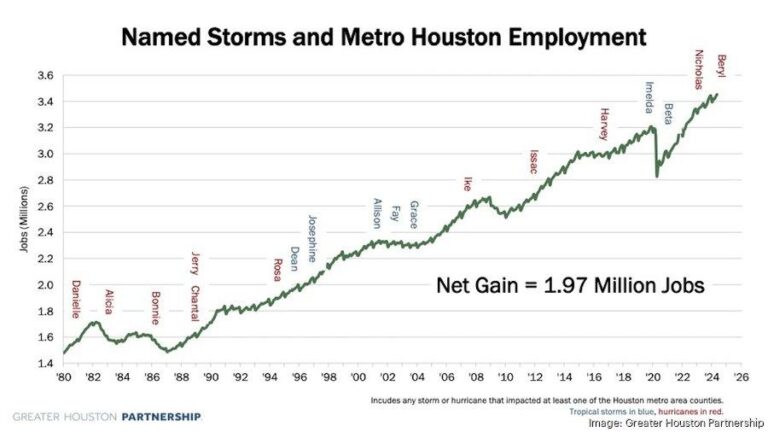HoustonŌĆÖs Employment Landscape: Navigating a Period of Slowed Job Growth
HoustonŌĆÖs Labor Market Experiences Significant Deceleration Amid Economic Uncertainty
Recent employment statistics reveal that HoustonŌĆÖs job growth has tapered to its slowest pace since 2016, signaling a cooling labor market. This deceleration is largely attributed to a combination of global economic volatility, fluctuating energy prices, and a more cautious approach to corporate investments. Despite ongoing initiatives to broaden the cityŌĆÖs economic base beyond energy, these headwinds are reshaping HoustonŌĆÖs employment trajectory and could influence the regionŌĆÖs economic health in the near term.
Not all sectors have been equally affected. While healthcare and technology continue to add jobs, albeit at a slower rate, traditional pillars like energy and manufacturing are experiencing stagnation or decline.
- Energy: Hiring growth nearly stalled due to unstable oil markets.
- Healthcare: Consistent job additions driven by rising demand for medical services.
- Technology: Moderate expansion fueled by startups and digital innovation projects.
- Manufacturing: Declining employment linked to supply chain disruptions and reduced export activity.
The table below outlines the percentage changes in employment across HoustonŌĆÖs key industries for May:
| Industry | Job Growth Rate (%) | Current Trend |
|---|---|---|
| Energy | +0.2 | Plateauing |
| Healthcare | +1.4 | Moderate Growth |
| Technology | +0.6 | Steady Expansion |
| Manufacturing | -0.3 | Contraction |
Sector-Specific Impacts: Which Industries Are Feeling the Strain?
The slowdown in HoustonŌĆÖs employment growth has disproportionately impacted several core industries, indicating a potential shift in the cityŌĆÖs economic dynamics. The energy sector, a traditional employment powerhouse, has seen a sharp reduction in new job creation due to volatile oil prices and cautious capital deployment. Manufacturing has also experienced a hiring slowdown, largely driven by persistent supply chain challenges and diminished export demand.
Meanwhile, service sectors such as healthcare and retail continue to grow but at a noticeably slower pace, reflecting consumer caution amid inflationary pressures and economic uncertainty. Below is a detailed overview of the sectors most affected by the May employment slowdown:
- Energy: Significant drop in new hires linked to market instability.
- Manufacturing: Hiring deceleration due to supply chain bottlenecks.
- Healthcare: Growth tempered by rising operational expenses.
- Retail: Recruitment slows as consumer spending becomes more conservative.
| Sector | Change in Job Gains (May) | Primary Driver |
|---|---|---|
| Energy | -12% | Oil price volatility and reduced investments |
| Manufacturing | -8% | Supply chain disruptions |
| Healthcare | -4% | Increased operational costs |
| Retail | -5% | Consumer spending caution |
Unpacking the Causes Behind HoustonŌĆÖs Sluggish Employment Growth
HoustonŌĆÖs labor market stagnation stems from a complex interplay of economic factors. Chief among these is the persistent uncertainty surrounding global energy markets, which continues to suppress hiring in the oil and gas sectorŌĆöa cornerstone of the local economy. Inflationary pressures and rising interest rates have further constrained business expansion plans, leading to more conservative hiring strategies across industries.
Additional challenges include ongoing supply chain disruptions that delay production and project rollouts, as well as demographic shifts affecting labor force participation rates. These elements collectively contribute to a cautious employment environment.
- Volatile energy prices impacting capital investment decisions.
- Inflation increasing operational expenses and slowing growth.
- Supply chain complexities causing production delays.
- Labor market participation affected by demographic changes.
| Factor | Effect on Employment |
|---|---|
| Energy Market Volatility | Hiring freezes and reduced workforce expansion |
| Inflation | Higher costs leading to slower business growth |
| Supply Chain Disruptions | Delays in manufacturing and project execution |
| Labor Force Participation | Shortages in skilled workers across sectors |
Effective Business Strategies to Weather Economic Volatility in Houston
To thrive amid economic unpredictability, Houston businesses are encouraged to implement comprehensive strategies that enhance resilience. Prioritizing cost efficiency through streamlined operations and prudent budgeting can protect profit margins. Leveraging advanced data analytics enables companies to anticipate market shifts and supply chain challenges, facilitating nimble responses.
Expanding into new markets and embracing digital transformation can diversify income sources, reducing vulnerability to local economic downturns. Additionally, cultivating strong partnerships with financial institutions ensures access to flexible funding options, providing a buffer against sudden economic shocks.
| Strategy | Focus Area | Expected Benefit |
|---|---|---|
| Cost Efficiency | Operational Streamlining | Protects Profit Margins |
| Data-Driven Insights | Market and Supply Chain Forecasting | Improves Agility |
| Market Diversification | New Revenue Channels | Mitigates Risk |
| Financial Collaboration | Liquidity and Capital Access | Enhances Stability |
- Maintain flexibility: Regularly review economic indicators and adjust business plans accordingly.
- Adopt technology: Utilize automation and digital platforms to reduce costs and broaden market reach.
- Invest in workforce skills: Develop employee capabilities to adapt to evolving industry demands.
Conclusion: Navigating HoustonŌĆÖs Employment Challenges with Strategic Adaptation
As Houston confronts its slowest employment growth in nearly a decade, the cityŌĆÖs economic stakeholders are closely watching how these trends evolve. The current environment underscores the importance of adaptability and innovation in sustaining economic vitality. Through targeted investments, policy support, and strategic business practices, Houston aims to revitalize its job market and maintain its position as a dynamic economic hub.




